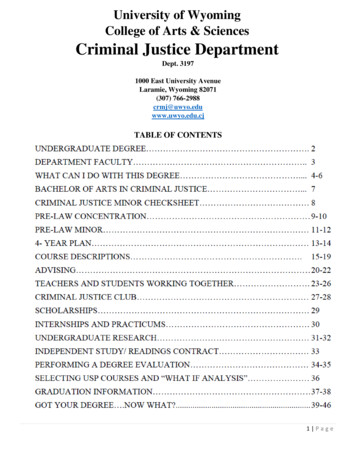
Transcription
University of WyomingCollege of Arts & SciencesCriminal Justice DepartmentDept. 31971000 East University AvenueLaramie, Wyoming 82071(307) 766-2988crmj@uwyo.eduwww.uwyo.edu.cjTABLE OF CONTENTS1 Page
Welcome to the University of WyomingCriminal Justice DepartmentThe Department of Criminal Justice is dedicated to providing educational opportunities in the areasof criminal justice and pre-law. The undergraduate curriculum consists of courses leading to theBachelor of Arts degree, with an option for a concentration in pre-law.Undergraduate Degrees:Bachelors of Arts (BA): A general degree which balances criminal justice studies with a liberal artsdegree. BA students are prepared to go right into the job market or pursue graduate school.Concentration:Pre-Law Concentration: Helps prepare students for law school. This concentration is an additionalcourse load paired with the Bachelor of Arts degree.Organization:Department of Criminal Justice Chair:Adrienne Freng, A&S 225, afreng@uwyo.edu, 766-2307Faculty:John Boman, A&S 329, jboman@uwyo.edu, 766-2988Scott Culhane, A&S 222C, sculhane@uwyo.edu, 766-2945Thomas Mowen, A&S 223, tmowen@uwyo.edu, 766-2988Kimberly Schweitzer, A&S 330, kschweit@uwyo.edu, 766-2988Shane Stone, UWC Campus, sstone7@uwyo.edu, 268-2930Eric Wodahl, A&S 330, ewodahl@uwyo.edu, 766-3803Department Staff:Jeannie Czech, Office Manager/Accountant, A&S 207, jeannie@uwyo.edu, 766-2960Summer Hansen, Office Associate, A&S 208, ssisner1@uwyo.edu, 766-2964Kimberly McMaster, Advising Coordinator, A&S 223, kmcmast1@uwyo.edu ,766-4973Jenn Mitchell, Office Associate, A&S 207, jkim11@uwyo.edu, 766-29882 Page
Criminal Justice DepartmentFacultyAdrienne FrengDepartment HeadPhD Sociology, University of Nebraska Lincoln, 2001MA Sociology, University of Nebraska Lincoln, 1997BA Sociology and Psychology, Black Hills State University, 1995John BomanKimberly Schweitzer(Assistant Professor)PhD Criminology, University of Florida, 2013MA Criminology, University of Florida, 2010BA Sociology/Criminology, Ohio University, 2007BS History, Ohio University, 2007(Assistant Professor)PhD Psychology, University of Wyoming, 2016MS Psychology, University of Wyoming, 2013BS Psychology, University of North Dakota, 2010Shane StoneScott Culhane(Associate Professor)PhD Legal Psychology, University of Texas at El Paso,2005MS Research Psychology, University of Tennessee atChattanooga, 2000BA Political Science and Psychology, University ofTennessee at Knoxville, 1998Thomas Mowen(Assistant Professor)PhD Sociology, University of Delaware, 2015MA Sociology, University of Louisville, 2011BS Sociology, University of Louisville, 2010(Assistant Academic Professional Lecturer-UWCC)PhD Educational Leadership, University of theCumberlands, 2016MA Theological Studies, Midwestern Baptist College,2011MS Criminal Justice Administrations, LindenwoodUniversity, 2000BS Criminal Justice Admin/Law Enforcement Function,Central Missouri State, 1992Eric Wodahl(Associate Professor)PhD Criminal Justice, University of Nebraska Omaha,2007MPA University of Wyoming, 2003BA Justice Studies, Chadron State College, 1994AA Criminal Justice, Eastern Wyoming College, 19823 Page
What Can I Do with a Degree inCriminal Justice?Social e JusticeCaseworkAdministrationProbations &ParoleVictim AdvocacyState and federal correction facilitiesCounty JailsPrecinct station housesPrison CampsYouth correction facilitiesMedium-security correction facilitiesVoluntary correction facilitiesHalfway houses and pre-release programsReintegration programsAlternative schoolsJuvenile detention centersJuvenile group homesWomen’s and family sheltersDomestic violence agenciesImmigration and naturalization servicesOther nonprofit organizationsStrategies:Seek courses of training in topics such as victimology, social problems, diversity issues, or grieving. Supplement curriculumwith courses in psychology, sociology, or social work. Gain experience working with a juvenile population in any capacity(i.e. sports teams, summer camp counselor, parks and recreation programs, and community/religious youth groups). Gainrelated experience in employment interviewing, social casework, substance abuse, and rehabilitation. Learn to work well withpeople of diverse backgrounds. Consider learning a second language. Maintain a blemish-free driving and criminal record.Gain firearms and self-defense training. Earn a master’s degree in social work or counseling for therapy positions. Obtain amaster’s degree in criminal justice or business for upper-level positions in facilities management or administration.Judiciary and LawEmployers:JobsLocal, State, and federal courtsLaw firmsCorporate legal departmentsPublic interest law organizationsCourt ReportingLegal AssistanceLegal ResearchAdministrationStrategies:Consider a double major or minor in the social sciences such as psychology, anthropology, sociology, or politicalscience. Attend a postsecondary vocational or technical college that offers court reporting or paralegal certificationprograms. Obtain a law degree from a law school accredited by the American Bar Association (ABA). Develop strongresearch, computer, and writing skills. Maintain a high grade point average to gain admittance to law school. Participatein mock trial groups.4 Page
Law EnforcementEmployers:JobsPolice departments, Correction facilities,County Sheriff departments, Liquor ProbationSecurityState Government Organizations including:Troopers, Crime Labs, PenitentiariesFederal Government Organizations including:U.S. Customs and Border Protection, FBI, IRS,DEA, CIA, Department of Homeland Security,Postal Service, Federal Marshals, Wildlife,Fisheries, and Parks, United States Departmentof Agriculture, National Parks, CrimeLaboratories, Colleges or UniversitiesStrategies:Obtain related training or certifications such as CPR, first aid, or EMT. Complete a formal police academy programupon graduation. Maintain a healthy and physically fit lifestyle. Volunteer to work in a police department or campussafety department. Complete an internship in a crime laboratory to gain experience in the forensic application ofscience. Obtain a double major in criminal justice and a hard science (biology, chemistry, or biochemistry) ifinterested in a career in forensics. Consider earning a master’s degree in Forensic Science or related discipline.Become familiar with the government application process. Learn a second language.BusinessJobsEmployers:Private SecurityConsultingInvestigatingSystems IntegrationGlobal IntelligencePrivate InvestigationInternet SecurityLoss and PreventionInsurance companiesBanksPrivate security companiesSoftware companiesHotels and resortsHealth care facilitiesTransportation servicesNuclear power plantsManufacturersOnline companiesOther large corporationsStrategies:Minor in business or computer science. Seek practicum/internship experiences that include training in the hardwareand software of security systems. Maintain good physical fitness. Develop exceptional written and oralcommunications skills. Seek leadership opportunities and develop strong interpersonal skills. Attend firearm safetycourses. Obtain first aid and CPR certification. Gain military experience and training. Earn a graduate degree inbusiness or law for upper-level positions.5 Page
EducationEmployers:JobsColleges and UniversitiesAdult education providersPublic and private high schoolsTeachingResearchStrategies:Earn a graduate degree for post-secondary teaching opportunities. Get a teaching certificate for elementary orsecondary education. Gain a dual certification for increased opportunities. Serve as a tutor to other students. Developstrong written and oral communication skills. Assist a professor with research. Take additional coursework related toresearch and statistics.General Information:Many criminal justice professions require candidates to possess strong oral and written communication skills and goodcomputer skills. The ability to speak a second language is also desirable.Develop good listening skills and the ability to work well with a wide range of diverse populations.Most entry-level position for criminal justice majors reside with law enforcement and social service organizations.Be willing to start in an entry-level job in order to prepare for more advanced career opportunities.Obtain experience through volunteer, practicum, or internship opportunities.Supplement program of study with courses in business, psychology, anthropology, or sociology. Course work related tothe hard sciences (biology, chemistry, or biochemistry) is preferred for career opportunities in forensics.Depending upon one’s career goals, earn a master’s degree in disciplines such as criminal justice, forensic science, publicadministration, social work, counseling or business to obtain positions involving therapy, higher levels of administration,forensics, or research. Earn the doctorate degree for university teaching positions.Conduct informational interviews with professionals in fields of interest to learn more about opportunities.Prepared by the Career Planning Staff of Career Services at the University of Tennessee, Knoxville. (2005) UTK is anEEO/AA/Title VI/ Title IX/ Section 504/ADA/ADEA Employer6 Page
7 Page
8 Page
Department of Criminal JusticePre-Law ConcentrationThe Department of Criminal Justice offers a Pre-Law concentration for Criminal Justice majors that consists of coursesselected from several departments across the University. These courses were chosen to help prepare students for thechallenges of law school and the practice of law.Along with the 33 hours of criminal justice degree requirements, an additional 27 credit hours, 18 of which must be 3000level courses or above, must be earned for the Pre-Law Concentration.Students who successfully complete this Pre-Law Concentration should be better prepared to compete for entry into lawschool and, ultimately, the rigors of law school and law practice as they will have been exposed to a diverse anddemanding undergraduate liberal arts curriculum.In addition to rigorous coursework and high academic achievement, law schools also prefer applicants with diverse extracurricular interests and involvement in campus activities.9 Page
10 P a g e
11 P a g e
12 P a g e
13 P a g e
14 P a g e
Criminal Justice (CRMJ) Course DescriptionsUSP Codes are listed in brackets by the 2003 USP code followed by the 2015 USP code (e.g. [QB Q]).CRMJ 1001 [2120] [ADJU 2120]. Introduction to Criminal Justice. 3. Introduces the American criminaljustice system. Examines nature of crime and describes historical and philosophical foundations of lawenforcement agencies, criminal courts and correctional institutions. Discusses major issues facing the criminaljustice system.CRMJ 2210 [ADJU 2210]. Criminal Law. 3. Introduces the fundamental principles of substantive criminallaw: the history and philosophy of modern criminal law, the basic dimension of criminality, the elements ofmajor crimes, criminal defenses and the nature of criminal sanctions. Prerequisite: CRMJ 1001 and completionof a USP V course.CRMJ 2400 [ADJU 2400]. Criminology. 3. Generally introduces the nature of crime, statistics on crime, typesof criminal behavior and explanations of crime. Cross listed with SOC 2400. Prerequisite: SOC 1000 orequivalent.CRMJ 2685 [CRMJ 3680, ADJU 3680]. Research Methods in Criminal Justice. 3. Introduces students tofundamental issues associated with the application of scientific methods to criminal justice problems. Studentsexamine research designs involving ethnographic, archival, historical, and quantitative methods and how theyrelate to criminal justice issues. Prerequisite: enrollment limited to criminal justice majors.CRMJ 3110. Criminal Courts and Processes. 3. Examines the structure, organization and operation ofcriminal courts and their role in the larger criminal justice system; the process of adjudication of criminal casesfrom initial charging through post-conviction review; the constitutional rights of the accused; and the roles ofthe major courtroom participants. Prerequisites: CRMJ 1001, CRMJ/SOC 2400, and CRMJ 2210 or declaredPublic Law minor.CRMJ 3200 [ADJU 3200]. Ethics in Administration of Justice. 3. Introduces basic ethical theories,emphasizing how ethical theory can be applied to contemporary problems in law enforcement, corrections andadjudication. Students will be called upon to apply these various ethical frameworks to typical moral dilemmasin criminal justice. Prerequisites: CRMJ 1001, CRMJ/SOC 2400, and CRMJ 2210.CRMJ 3250 [ADJU 3250]. Juvenile Delinquency. 3. Considers the nature of delinquency, including ananalysis of treatment methods and the juvenile justice system. Prerequisites: CRMJ 1001, CRMJ/SOC 2400,and CRMJ 2210.CRMJ 3320. Family Violence. 3. Prevalence, types and causes of family violence are examined with anemphasis on a sociological understanding. Theories of violence are applied to the conflict that exists within thefamily institution such as woman battering, courtship conflict and child abuse. Prerequisite: 6 hours ofsociology or equivalent social science (including SOC 1000).CRMJ 3350 [ADJU 3350]. Correctional Theory and Practice. 3. Examines the various components of thecorrectional complex from both theoretical and practical frameworks. Students are exposed to the abundance ofresearch that informs current correctional practice and will be called upon to critically evaluate this research andits implications for correctional policy and practice. Prerequisite: CRMJ 1001, CRMJ/SOC 2400, CRMJ 2210,and CRMJ 2685.15 P a g e
CRMJ 3400 [ADJU 3400]. Deviant Behavior. 3. Examines theory and research relevant to understandingdeviant behavior in general and specific types of individual and subcultural deviancy. Cross listed with SOC3400. Prerequisite: SOC 1000 or equivalent.CRMJ 3490 [ADJU 3490]. Issues in Policing. 3. Examines the various components of policing from boththeoretical and practical frameworks. Students are exposed to the abundance of research that informs currentpolicing practice and will be called upon to critically evaluate this research and its implications for policingpolicy and practice. Prerequisites: CRMJ 1001, CRMJ/SOC 2400, CRMJ 2210, and junior standing.CRMJ 3500. Drugs and the Criminal Justice System. 3. Focus on drugs and their impact on society.Particular interest is paid to the extent of drug use/abuse in America, and the effects of this problem on thecriminal justice system and society as a whole. Strategies for controlling both supply and demand are discussed.Prerequisites: CRMJ 1001 and CRMJ/SOC 2400.CRMJ 4110 [ADJU 4110]. Constitutional Law: Civil Liberties and Rights. 3. Encompasses case-studyanalysis of judicial decisions and policies of the constitutional interpretation of the 1st Amendment (freedom ofspeech, press, association and religion), privacy rights, the rights of the criminally accused, and civil rights(racial and gender equality). Cross listed with POLS 4110. Prerequisites: 9 hours of POLS courses, POLS 3100recommended.CRMJ 4130 [ADJU 4130]. Leadership and Management in the Criminal Justice System. 3. There is a clearneed for managers and administrators to understand leadership and ethics. This course is designed to providestudents with a foundation in the management and leadership discourse surrounding criminal justice agencies.Dual listed with CRMJ 5130. Prerequisites: CRMJ 1001, CRMJ/SOC 2400, CRMJ 2210, and CRMJ 3490.CRMJ 4140 [ADJU 4140]. Criminal Legal Procedure. 3. Examines the constitutional principles thatsafeguard the rights and liberties of criminal suspects and constrain police during the investigatory stages of thecriminal justice process: arrest; search and seizure; interrogation; undercover operations; pretrial identification;and the exclusionary rule. Prerequisites:CRMJ 1001, CRMJ 2210, and CRMJ/SOC 2400, or declared PublicLaw minor.CRMJ 4150. Community-Based Corrections. 3. Designed to provide students with an in-depthlook at the community corrections complex. It will examine the history and growth of community corrections,the probation system, methods of post-incarceration supervision, intermediate sanctions, and correctionalprogramming and treatment in the community. Prerequisites: CRMJ 1001, CRMJ/SOC 2400, CRMJ 2210, andCRMJ 3350.CRMJ 4151 [3150]. Crime Causation. 3. Examines the causal mechanisms that produce crime. Theoreticalperspectives and empirical research from various disciplines will be evaluated, with particular emphasis placedon social factors that may cause crime. Policy implications of the different perspectives will be discussed. Duallisted with CRMJ 5151. Prerequisites: CRMJ 1001, CRMJ/SOC 2400, and CRMJ 2210.CRMJ 4230. Forensic Anthropology. 3. Introduces methods and purposes of physical anthropology as appliedin human identification for law enforcement agencies. Cross listed with ANTH 4230. Prerequisite: ANTH 1100.16 P a g e
CRMJ 4260. Gangs. 3. Considers the nature and the characteristics of gangs and gang members. Thetheoretical and empirical evidence regarding the phenomenon of gangs is evaluated. Particular emphasis isplaced on the social and policy implications of this social problem. Prerequisites: CRMJ 1001, CRMJ/SOC2400, CRMJ 2210 and upper division standing in criminal justice.CRMJ 4280 [ADJU 4280]. Comparative Criminal Justice. 3. [WC,G (none)] Compares the incidence,trends, control, treatment and prevention of crime across nations using mainstream criminological theories.Examines criminal justice systems from an international perspective and draws lessons for the Americansociety. Explores forms of international cooperation and difficulties in the control of transnational crimes.Prerequisite: WA, WB, CRMJ 1001, junior standing.CRMJ 4350 [ADJU 4250]. Sociology of Law. 3. A consideration of sociological concepts such as inequality,stratification, social control and social change in an analysis of the law and legal institutions. Topics include:the role of the police, lawyers, judges, and juries; race, sex, age, and sexuality discrimination and civil rights;free speech, and toxic torts. Cross listed with SOC 4350. Prerequisites: SOC 1000 and upper division status.(Offered based on sufficient demand and resources)CRMJ 4370 [ADJU 4370]. Criminal Psychopathology. 3. Provides an overview of current theories andempirical evidence concerning the relationship between psychological disorder and criminal behavior.Examines various clinical syndromes and their role in biological, social and psychological genesis of crime, aswell as the concept of criminal responsibility. Cross listed with PSYC 4370. Prerequisite: 6 hours in psychologywith a grade of C or better.CRMJ 4540. Women, Crime and the Law. 3. Addresses status of women as offenders and as victims insociety and in the criminal justice system. Considers special role of women as professionals in the criminaljustice system. Cross listed with WMST 4540. Prerequisite: WMST/SOC 1080, 3500 or CRMJ/SOC 2400.CRMJ 4600 [ADJU 4600]. Political Violence. 3. Examines causes and consequences of violence both amongindividuals and among nations. Cross listed with POLS 4600. Prerequisite: POLS 1000, or SOC 1000, or POLS1200, or POLS 1250, or POLS 2310, or permission of instructor. (Normally offered every other year)CRMJ 4700. Global Terrorism. 3. Examines the concept, causes, incidence, types, consequences of, andresponses to terrorism. Highlights the distinction between domestic and international terrorism and expands onthe latter within the framework of the global environment. Prerequisites: CRMJ 1001, CRMJ /SOC 2400, andCRMJ 2210.CRMJ 4730. Psychology and Law. 3. Exposes students to the application of psychological principles toproblems in law. Emphasizes the American trial system, correction systems and civil commitment. Cross listedwith PSYC 4730. Prerequisite: 6 hours in psychology with a grade of C or better.CRMJ 4750 [ADJU 4750]. Internship in Criminal Justice. 1-12 (Max. 12). Integrates practical criminaljustice experience with academic knowledge. Students participate in specifically assigned duties and observebroader activities of the sponsoring organization, and reflect upon these experiences through writtenassignments. Prerequisite: junior standing, 2.5 cumulative GPA, completion of at least 6 upper division hours inCRMJ and consent of instructor.17 P a g e
CRMJ 4760. Child Maltreatment. 3. Lecture and seminar. Examines the phenomenon of child abuse andneglect. Includes an overview of attitudes towards and legal definitions of child maltreatment. Explores parentalfactors, contextual influences and developmental consequences of maltreatment. Relies heavily on currentresearch in child abuse and neglect. Emphasizes policy implications. Cross listed with PSYC 4760. Prerequisite:6 hours in psychology with a grade of C or better. (Offered alternate years)CRMJ 4860. Social Inequality, Crime, Criminal Justice and the Law. 3. Provides an in-depth look at socialinequality and its impact on crime, criminal justice, and the law. Particular emphasis will be given to theindividual and interactive effects of race, class, and gender inequality. Critical theoretical perspectives thatpromote social justice will be the primary analytical focus. Dual listed with CRMJ 5860. Prerequisites: CRMJ1001, CRMJ/SOC 2400, and CRMJ 2210.CRMJ 4890. Serial Killers. 3.Introduces students to particular case studies of notorious serial killers andexplores current methods of tracking and apprehending such individuals. Draws on readings, films, and lectures.Prerequisites: CRMJ 1001, CRMJ/SOC 2400, CRMJ 2210, junior standing, and 6 completed hours of upperdivision criminal justice courses.4965. Research Hours in Criminal Justice. 1-6 (Max. 6). Provides undergraduates with an opportunity toassist in conducting various aspects of research under the supervision of criminal justice faculty. Specificresearch activities and requirements will be determined in consultation with the sponsoring faculty person.Credit is only available for research corresponding to enrollment in this course. Dual listed with CRMJ 5965.Prerequisites: upper division standing and consent of instructor required in advance.CRMJ 4970 [ADJU 4970]. Criminal Justice Practicum. 9-12 (Max. 12). Integrates academic knowledge withapplied administration of justice experience through supervised field placement. Students are required tocomplete reading, discussion and writing assignments in addition to their practicum responsibilities.Prerequisites: junior standing and consent of practicum coordinator.CRMJ 4975 [ADJU 4975]. Readings. 1-3 (Max. 6). Special programs of readings in criminal justice relatedsubjects will be outlined to meet needs of individual students. Prerequisite: consent of instructor.CRMJ 4990 [ADJU 4990]. Topics: . 1-3 (Max. 6). Intended to accommodate various special subjects notoffered as regular courses. Prerequisites: as listed for housing department’s topics course.CRMJ 5000. Survey of Criminal Justice. 3. Provides an overview of criminal justice theory by providingcritical evaluation and discussion of research in the criminal justice field. It will emphasize seminal works andreview current research concerning the structure, function, operation, interaction of the criminal justice system’sprimary components, and future trends. Prerequisite: Admission to the MPA Program.CRMJ 5100. Public Policy and Crime. 3. This course is designed to take a multidimensional look at publicpolicy issues related to the prevention and control of crime in the United States. Issues covered include thedevelopment, implementation, and evaluation of crime control policy. Prerequisite: Admission to the MPAProgram.18 P a g e
CRMJ 5130. Leadership and Management in the Criminal Justice System. 3. There is a clear need formanagers and administrators to understand leadership and ethics. This course is designed to provide studentswith a foundation in the management and leadership discourse surrounding criminal justice agencies. Duallisted with CRMJ 4130. Prerequisites: graduate standing or consent of instructor.CRMJ 5151. Crime Causation. 3. Examines the causal mechanisms that produce crime. Theoreticalperspectives and empirical research from various disciplines will be evaluated, with particular emphasis placedon social factors that may cause crime. Policy implications of the different perspectives will be discussed. Duallisted with CRMJ 4151. Prerequisite: graduate standing or consent of instructor.CRMJ 5500. Internship in Criminal Justice. 3. Educationally-oriented assignments for work in selectedcriminal justice agencies, with tutorial types of supervision. Offered Satisfactory/Unsatisfactory only.Prerequisite: Admission to the MPA Program and consent of the instructor.CRMJ 5860. Social Inequality, Crime, Criminal Justice and the Law. 3. Provides an in-depth look at socialinequality and its impact on crime, criminal justice, and the law. Particular emphasis will be given to theindividual and interactive effects of race, class, and gender inequality. Critical theoretical perspectives thatpromote social justice will be the primary analytical focus. Dual listed with CRMJ 4860. Prerequisite: graduatestanding or consent of the instructor.CRMJ 5965. Research Hours in Criminal Justice. 1-6 (Max. 6). Provides students with an opportunity toassist in conducting various aspects of research under the supervision of criminal justice faculty. Specificresearch activities and requirements will be determined in consultation with the sponsoring faculty person.Credit is only available for research corresponding to enrollment in this course. Dual listed with CRMJ 4965.Prerequisites: consent of instructor.19 P a g e
AdvisingAdvising should be viewed as a cooperative activity between the student and the advisor, but the final responsibility formeeting requirements resides with the student.Students1. To prepare for an advising session, the studentshould: know the requirements for the degree (atthe university, college, and departmentallevels). check the online progress report todetermine remaining requirements. compile a preliminary list of courses forthe upcoming semester. be aware of and respect the prerequisitesfor courses.2. Students should refer to the class schedule onthe web for any changes or cancellations.3. Students must schedule appointments duringthe advisor’s available posted times forAdvising Week to determine the nextsemester’s courses and get the Permission toRegister number (PERC).4. Students should learn how to use the printedcopies or the up-to-date online versions of theUW Bulletin, Class Schedules, and the Collegeof A&S and departmental websites for coursedescriptions and prerequisites, degreerequirements, and rules and regulations ofdeadlines for class withdrawals, course repeats,etc.5. Students should consult with advisors duringthe semester, not just at next semester’s classscheduling session. These more relaxedadvising sessions are opportunities for adviseesand advisors to get to know each other, todiscuss their goals, future study, and careers.When necessary, the advisor will makereferrals to the career services office or otherappropriate help centers.Teachers as Advisors1. Advisors should be knowledgeable ofrequirements and use the online progress reportfor advising. Advisors should also refer to theclass schedule on the web for any changes andcancellations.2. Advisors should make sure that anyexemptions or substitutions to the student'sacademic requirements in the major are postedto the online progress report.3. For Advising Week, advisors should postavailable times for advisees to sign up forappointments.4. Advisors should take time to orient newadvisees to the use of the information in theUW Bulletin, Class Schedules (hard copy or upto date information online), and the College ofA&S and departmental websites to learn aboutcourse descriptions and prerequisites, degreerequirements, and rules and regulations ofdeadlines for class withdrawals, course repeats,etc.5. Advisors should encourage advisees to visitwith them at other times during the semester,not just at next semester’s class schedulingsession. These more relaxed advising sessionsare opportunities for advisees and advisors toget to know each other, to discuss the advisee’sgoals, future study, and careers. If necessary,advisors should make referrals to the careerservices office or other appropriate helpcenters.20 P a g e
Advising in the CollegeWho will be my AdvisorThe College of Arts and Sciences considers academic advising to be an essential part of astudent’s road to a baccalaureate degree and emphasis is placed on that process.Academic advising in the College of Arts and Sciences is located in each of the departments andprograms. Students who declare a major are assigned an advisor in the department/program of theirmajor. Students who are undecided about a major are advised in the Center for Advising and CareerServices, 222 Knight Hall, 766-2398.The advising relationship is a Partnership— you take an active role in establishing andmaintaining contact with your advisor as you assume ever-increasing responsibility for knowing theacademic requirements and university procedures.Expectations of the AdvisorStudents join our university community at different stages of personal development, experience, andacademic preparation. While you are here, you will add to your knowledge, develop the tools and skills tofind answers, ask more questions, and develop a greater understanding of your values and goals. Yourteachers and advisors will be your guides in this growth. They will encourage you to master the skillsessential for independent problem solving and decision making. Get to know your academic advisor e
PhD Sociology, University of Delaware, 2015 MA Sociology, University of Louisville, 2011 . University of the Cumberlands, 2016 MA Theological Studies, Midwestern Baptist College, . Complete a formal police academy program upon graduation. Maintain a healthy and physically fit lifestyle. Volunteer to work in a police department or campus .
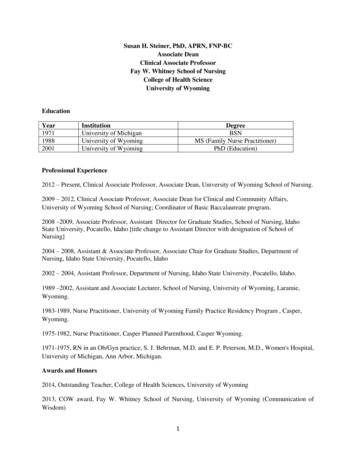
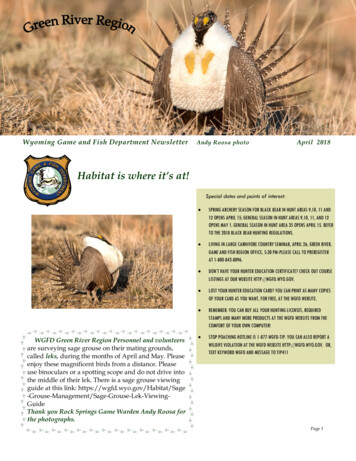
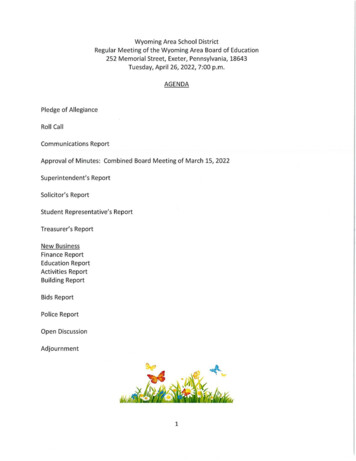
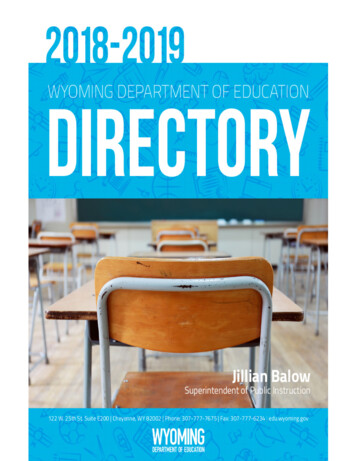
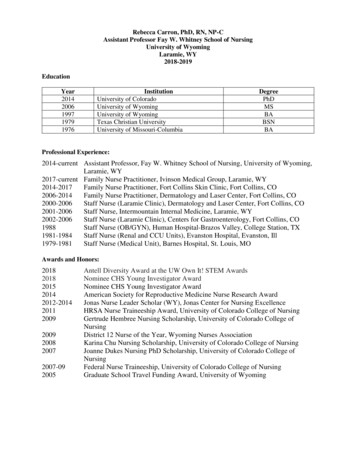
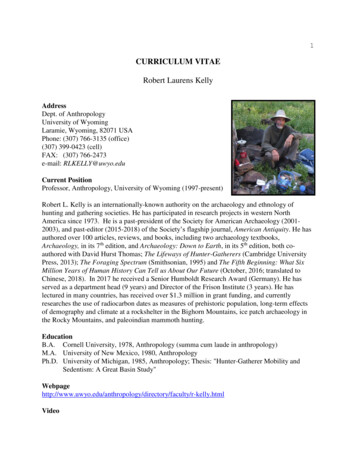

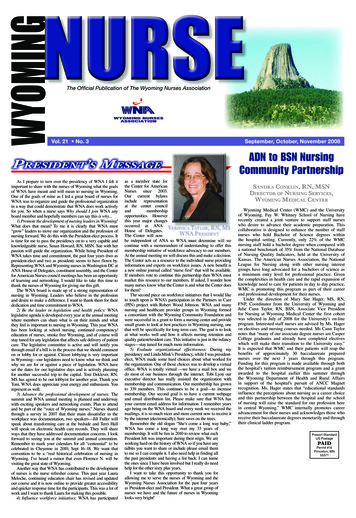
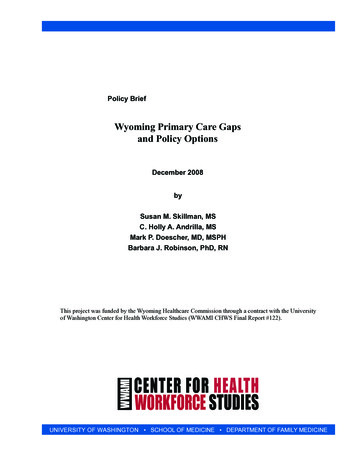


![Welcome [ wyomingworkforce ]](/img/14/program.jpg)